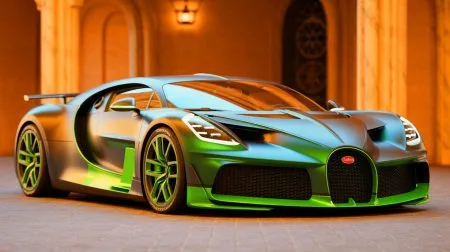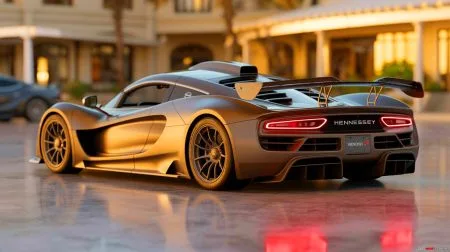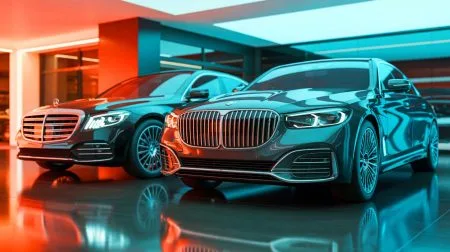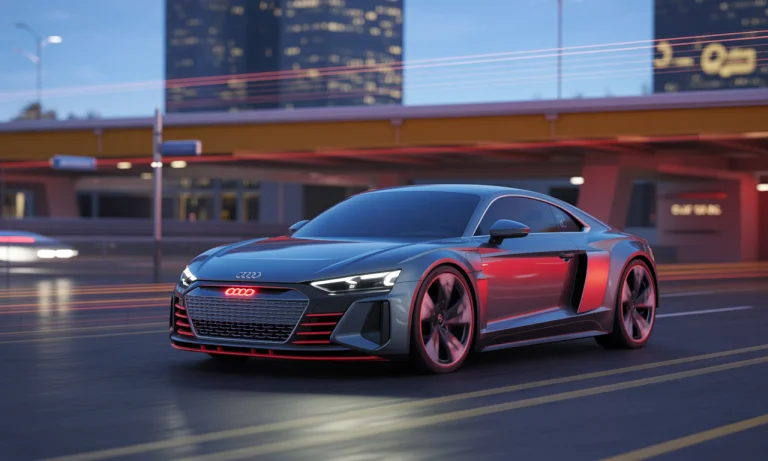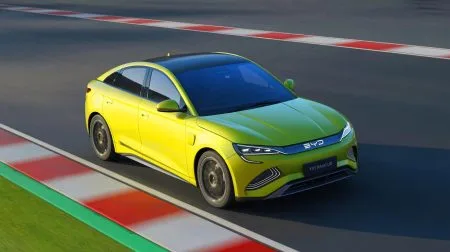When Audi quietly bid farewell to its iconic TT and the powerful R8, many thought the brand had closed the book on compact, thrilling sports cars. Yet this year, in a move both bold and enigmatic, the Ingolstadt-based automaker has confirmed a brand-new sports car—one that’s pointedly not a TT and isn’t tethered to the R8’s legacy either. This model, rising from what Audi calls Concept C, seeks to challenge the conventions of electric driving by splicing high-tech illusions—simulated gear shifts and engine sounds—into its DNA. With rivals like Porsche, Mercedes-Benz, BMW, Jaguar, and others pushing the boundaries of electric performance, Audi’s new creation settles into the sweet spot between the nostalgia of gasoline and the exhilarating future of electric speed. But can software trickery truly fill the void left by the legendary five-cylinder? As fascinated drivers and industry-watchers wonder if this new contender will become a future classic or just an intriguing experiment, the stakes for Audi have never felt higher.
Between Legends: Audi’s Upcoming Sports Car and Its Place Beyond the TT Name
Tucked away in Audi’s blueprint for the future is a daring answer to a complex question: how does a brand respected for signature models like the TT and R8 shift into the electric era without losing its soul? Gernot Döllner, Audi’s CEO, has made it clear—this isn’t about reviving past glories. The new sports car, built around the innovative Concept C, lands neatly between the outgoing TT RS’s raw 400-horsepower punch and the R8’s 600+ horsepower V-10 pedigree. The resulting machine, he implied, will synthesize these performance benchmarks—yet eschew both legendary names.
The search for a fitting badge remains open, Döllner teases, hinting at either a “real” name or perhaps one that starts with “R.” This unconventional naming journey mirrors Audi’s broader willingness to experiment—embracing new technologies to keep up with the likes of Mercedes-Benz, BMW and Porsche, whose own electric dreams are reshaping the sports car arena.
| Previous Audi Sports Car | Engine Layout | Horsepower | Era |
|---|---|---|---|
| TT RS | 5-cylinder gasoline | 400 hp | 1998-2023 |
| R8 V10 | 10-cylinder gasoline | 610+ hp | 2006-2023 |
| New Audi Sports Car (Concept C-based) | Electric motor(s) | Estimated 500 hp (midpoint) | 2025 and beyond |
Why Audi Turned Away from the TT Legacy for Its Next Sports Car
The TT’s discontinuation left a void, one not easily filled by anything resembling tradition. For years, demand for classic sports cars waned, squeezed by shifting tastes and the rise of performance EVs from brands like Jaguar, Aston Martin, and Maserati. Audi’s choice not to inherit the TT name for its upcoming model signals a deliberate break—an invitation to new experiences over nostalgia. This approach echoes what’s happening at Lexus and Tesla, as they too reshape expectations around luxury and performance without clinging to the past.
Take the case of Julian, a longtime Audi enthusiast in Munich, who mourned the TT’s passing only to discover the excitement brewing around Concept C. His anticipation is shared by thousands on forums and car meets, with debates about whether this leap into EV theatrics can match the visceral thrill of a true five-cylinder.
The Virtual Revolution: Simulated Sounds and Shifts in Audi’s Electric Sports Car
Audi’s strategy goes beyond pure numbers and names; it’s about sensation. Modern electric vehicles, no longer the silent, sterile rides of the past, are finding ways to bring back the emotional cues drivers crave. Döllner himself admits that—on the racetrack—synthetic gear shifts and simulated engine noise quite literally change the pace. When every tingle and vibration matters, as he puts it, the illusion can make an electric lap time even quicker than the real thing.
Elsewhere in the performance world, innovations abound: the Hyundai Ioniq 5 N nearly perfects fake gears, while the upcoming electric M3 and Kia EV6 GT offer their own takes on artificial engagement. In contrast, Dodge’s Charger Daytona EV prioritizes fake sound but skips the transmission mimicry, while Ferrari’s patents suggest even richer illusions on the horizon.
| Car Brand | Simulated Gears | Simulated Sounds | Unique Feature |
|---|---|---|---|
| Audi (Concept C-based) | Yes | Yes (incl. 5-cyl. sound) | Advanced digital cockpit |
| Lexus | Yes | Yes | LFA-inspired noises |
| Porsche | Testing | Yes | 718 EV performance link |
| Hyundai (Ioniq 5 N) | Yes (most refined) | Yes | Immersive track mode |
| BMW (M3 EV) | Yes | Yes (artificial exhaust) | Linked to drive modes |
| Dodge (Charger Daytona) | No | Yes | Brutal exhaust sound |
The Philosophy Behind Synthetic Experience in Future Sports Cars
This rise of simulated driving sensations isn’t merely a ploy—it’s an evolution. The trend recalls skeuomorphism in software design: digital interfaces mimicking the tactile switches or dials of analog gear. Here, gear-shifts and rev notes in an EV serve as psychological bridges, welcoming lifelong drivers of combustion-powered machines into the zero-emissions future. Auto enthusiasts who grew up idolizing the lightning-quick shifts of a Maserati, the evocative howl of an Infiniti or the symphonic rumble of a classic Aston Martin, might now find themselves charmed by digitized echoes of that heritage.
For engineers and drivers alike, the focus shifts from replicating the past to enriching the present. What matters is the rush—the micro-second communication between machine and driver. As manufacturers like Audi and Porsche push the boundaries, they ensure their legacy thrives, even as it transforms. The question lingers: Will software magic win over purists, or set the new bar for engagement across brands?
Setting the Stage: Audi’s Leap into a New Era of High-Performance Electric Sports Cars
The automotive universe never stands still. As Concept C matures into a production reality, Audi positions itself to challenge not just legacy foes like Porsche and BMW, but also next-generation icons from Mercedes-Benz, Jaguar, Tesla, and even boundary-pushing entries from Aston Martin and Infiniti. Each brand weighs tradition against innovation, and each embarks on a uniquely calibrated journey—one foot in heritage, the other in the future. Onlookers recognize that true innovation lies not in deserting automotive roots, but in reimagining what is possible behind the wheel.
| Brand | New Electric Sports Car | Legacy Inspiration | Release Timeline |
|---|---|---|---|
| Audi | Concept C production model | TT, R8 (in spirit only) | 2027 |
| Porsche | All-electric 718 Boxster/Cayman | 911, 718 | Soon |
| BMW | Electric M3 | M Series | Later this decade |
| Mercedes-Benz | AMG electric coupes | AMG GT | Mid-2020s |
| Jaguar | Electric F-Type successor | F-Type | Late 2020s |
| Aston Martin | Valhalla EV (planned) | Vantage, DB series | Future |
In the end, a brand’s ability to weave compelling stories—of technology, artistry, and emotional resonance—defines its success. Audi’s new electric sports car may not carry the TT name, but it aspires to carry something deeper: an embrace of legacy without fear, and an appetite for reinvention as fierce as the competition it faces on road and track alike.
Key Questions about Audi’s Upcoming Electric Sports Car Unrelated to TT
Will Audi’s new sports car use the TT or R8 nameplate?
No, Audi confirmed that the TT legacy will not continue through this car, nor will the R8 name be revived. The company is exploring new names, possibly starting with ‘R’, according to CEO Gernot Döllner.
What performance can we expect from the Concept C-based Audi sports car?
Audi’s CEO indicated the new model will bridge the gap between the performance figures of the old TT RS (400 hp) and the R8 (600+ hp). The electric drivetrain will deliver a balance of accessible power for track and road use.
How does Audi plan to make electric driving feel exciting?
Through innovations like simulated gear shifts and engine sounds—including digitally recreating Audi’s famous five-cylinder soundtrack—drivers will experience a visceral connection to the car, similar to traditional gasoline sports cars.
Is Audi the only manufacturer using these “fake” features in electric sports cars?
No, several brands including Lexus, Porsche, BMW, Hyundai, and Kia are experimenting with simulated sounds and gear shifts to enhance EV sensations. It’s becoming an industry-wide trend as seen here.
When will this new Audi sports car arrive?
Production is slated to begin by 2027, with public appearances for the Concept C and production prototype occurring ahead of release. Audi is aiming to capture both attention and imagination as the EV revolution accelerates.
Did you like it? 4.5/5 (24)
